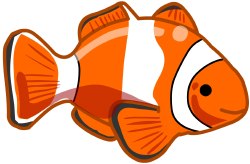 Fish and shellfish are an important part of a healthy diet. They contain protein and other essential nutrients, are low in saturated fat, and contain omega-3 fatty acids. A well-balanced diet that includes a variety of seafood can contribute to heart health and children’s proper growth and development.
Fish and shellfish are an important part of a healthy diet. They contain protein and other essential nutrients, are low in saturated fat, and contain omega-3 fatty acids. A well-balanced diet that includes a variety of seafood can contribute to heart health and children’s proper growth and development.
However, nearly all seafood contains traces of mercury. For most people, the risk from mercury in fish is not a health concern. Yet, some fish and shellfish contain higher levels of mercury that may harm an unborn baby or young child’s developing nervous system and this depends on the amount of seafood eaten and the levels of mercury in these foods.
The Food and Drug Administration (FDA) and the Environmental Protection Agency (EPA) advise that women who may become pregnant, pregnant women, nursing mothers, and young children avoid some types of fish and shellfish.
To reduce exposure to mercury while obtaining benefits of eating fish, the FDA recommends that you:
1. Do not eat shark, swordfish, king mackerel or tilefish because they contain high levels of mercury.
2. Eat up to 12 ounces (2 average meals) a week of a variety of fish and shellfish that are lower in mercury (shrimp, canned light tuna, salmon, Pollock, and catfish).
What effect does the oil spill have on the fish in the Gulf of Mexico?
The FDA is working with the National Oceanic and Atmospheric Administration (NOAA) National Marine Fisheries Service, the EPA, other Federal agencies and several state authorities in the regions affected by the recent oil spill. Federal and state officials are monitoring the waters from which seafood is harvested and will act to close areas contaminated by the oil spill to fishing. A large area of the Gulf of Mexico and been closed to commercial fishing and the FDA has authority to seize any adulterated seafood that may show up in markets.
According to the FDA:
- Although crude oil has the potential to taint seafood with flavors and odors cause by exposure to hydrocarbon chemicals, the public should not be concerned about the safety of seafood in stores at this time.
- Fish and shellfish harvested from areas unaffected by the closures are considered safe to eat.
For more information about the effect of the oil spill on pregnant women, click here
You can call 1-888-INFO-FDA if you have concerns about seafood you have purchased that you suspect is contaminated with oil.

Comments
Pages